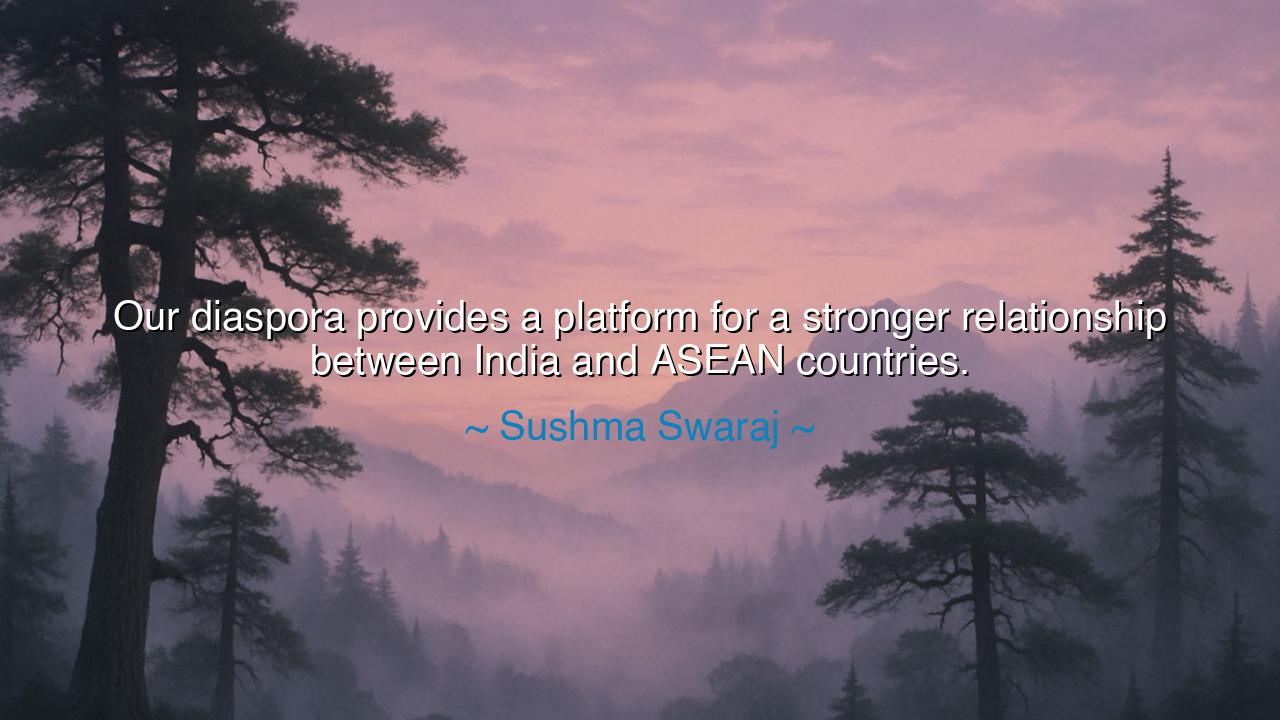
Our diaspora provides a platform for a stronger relationship
Our diaspora provides a platform for a stronger relationship between India and ASEAN countries.






The revered diplomat Sushma Swaraj spoke of unity and shared destiny when she declared: “Our diaspora provides a platform for a stronger relationship between India and ASEAN countries.” These words are filled with vision, for they acknowledge the power of people scattered across lands, who serve as living bridges between nations. In them lies the ancient truth that human connections are mightier than treaties alone, and that the strength of a nation flows not only from its soil but also from the hearts of its people abroad.
The diaspora is like a river that leaves its source, carrying the essence of its homeland to distant shores. These sons and daughters of India, dwelling amidst the diverse peoples of the ASEAN countries, bring with them traditions, values, and skills. Through their lives and contributions, they weave bonds of trust and cooperation, linking two worlds together. In this way, they become ambassadors of culture and commerce, uniting nations not by force, but by shared understanding.
A platform is not merely a foundation, but a space where voices are raised and partnerships are forged. The diaspora forms such a platform, creating opportunities for dialogue and mutual growth. Through trade, education, art, and diplomacy, they transform distance into closeness, ensuring that the relationship between India and its neighboring nations is not one of mere politics, but of deep and enduring kinship.
This vision is rooted in history. For centuries, the lands of India and Southeast Asia have exchanged ideas, goods, and beliefs—through sailors, scholars, and pilgrims who crossed oceans and built civilizations together. Swaraj’s words call upon this legacy, urging the present generation to honor their ancestors by strengthening these ties in a modern world of globalization and shared challenges.
Thus, let this teaching endure for future generations: cherish the power of the diaspora, for they are the living threads that bind nations. When people embrace their role as bridges rather than barriers, a tapestry of peace and prosperity is woven. Through unity and cooperation, the relationship between India and the ASEAN countries will not only grow stronger but will serve as a beacon of harmony for all nations to follow.






T.trangnii .198
I appreciate Sushma Swaraj’s perspective that the Indian diaspora strengthens relations between India and ASEAN countries. However, it also makes me question how much influence the diaspora can have in shaping official policies or international agreements. Can they act as informal ambassadors, or are their contributions more symbolic? How can both India and ASEAN countries better support and empower the diaspora to foster more substantial diplomatic ties?
APTram Anh Pham
Sushma Swaraj’s insight into the Indian diaspora’s role in building stronger ties between India and ASEAN countries is a reminder of how powerful human connections can be in diplomacy. But I wonder, what challenges do these diaspora communities face when trying to be the bridge between two distinct cultures and political systems? How do they navigate the complexities of representing both their home country and their host nation in diplomatic matters?
KNKhanhchi Nguyen
It’s fascinating how Sushma Swaraj highlights the Indian diaspora’s role in strengthening the relationship with ASEAN countries. It seems like the diaspora’s contribution could be multifaceted—ranging from cultural exchanges to business opportunities. But can we measure the true impact of the diaspora in terms of tangible results, or is it more of a long-term influence? How do we ensure that the diaspora’s impact is recognized and leveraged in international relations?
ABTran An Binh
Sushma Swaraj’s point about the Indian diaspora creating a stronger connection between India and ASEAN countries raises an interesting question. The diaspora often brings valuable insights, but can it sometimes cause a disconnect if it’s not unified in its purpose or vision? How do we ensure that the voices of the diaspora are used constructively and cohesively to help foster deeper ties, rather than creating friction or misunderstandings between the countries?
8NQuoc Dung 8/4 NLB
I agree with Sushma Swaraj’s statement about the Indian diaspora playing a role in strengthening the relationship between India and ASEAN countries. But what happens when the diaspora is caught between two cultures? Can they truly represent both sides effectively? While they can act as a bridge, can their contributions always be in sync with the goals of both India and the ASEAN nations, or are there moments of cultural or political tension?